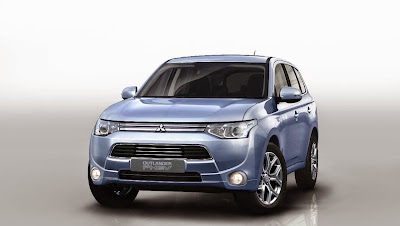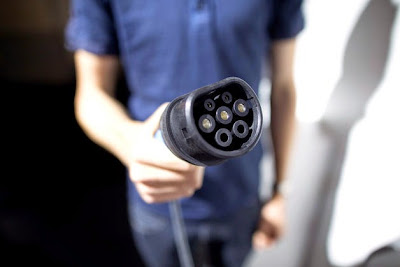Chancellor Angela Merkel said Germany will need to provide more incentives to meet a goal of having 1 million electric cars on the country’s roads by 2020.
“There’s a lot to do,” Merkel said today during a press conference in Berlin. “We see that further subsidies are necessary. We must speak with the German states about that.”
Merkel is far behind in her push for 1 million electric autos in part because her government has balked at incentives like those offered in France, where consumers receive as much as 6,300 euros ($7,840) to help cover the higher cost of low-emission vehicles. Germany, which has about 24,000 electric autos on its roads, is considering offering a tax break for zero-emission vehicles sold as company cars.
“We’re far from our goal to establish Germany as a leading market for electro-mobility,” said Matthias Wissmann, president of German auto-industry lobby VDA. “The government needs to act” on plans such as the corporate tax reduction.
The chancellor is trying to reduce emissions by pushing the country’s auto industry to build more electric cars after French, Japanese and American carmakers got off to an early lead. German auto manufacturers will offer 17 electric models by the end of 2014, and another 12 will go on sale next year, according to the VDA.
Charging Stations
Merkel’s cabinet announced plans in September to offer electric-car buyers special privileges, backing a bill that would enable municipalities to offer drivers of battery-powered cars, fuel cell vehicles and some plug-in hybrids free parking and the right to use bus lanes.
The country has 4,800 charging stations, said Henning Kagermann, a former chief executive officer of software maker SAP who is heading the government’s electric-car effort. Transport Minister Alexander Dobrindt said Germany will add 400 stations at rest stops along the autobahn network to make it possible to travel across the country with electric vehicles.
“We need a super-charger infrastructure where you can charge 80 percent of the battery in 15 minutes,” said Stefan Bratzel, director of the Center of Automotive Management at the University of Applied Sciences in Bergisch Gladbach, Germany. “The government can help to establish standards for plugs to make the charging stations accessible for vehicles of all brands. We’re still very much in the wild electro-west.”
BMW i3
Zero emission vehicles from German automakers include Bayerische Motoren Werke AG’s i3 city car as well as electric versions of Daimler AG’s Smart two-seater and Mercedes-Benz B-Class. Volkswagen AG sells the Up! and Golf with electric motors. The offerings follow the entry into the market of Tesla Motors Inc.’s S Model, Nissan Motor Co.’s Leaf and General Motors Co.’s Volt.
Germany was a transport pioneer when it opened Europe’s first car-only highway in 1921 in Berlin. Its free-wheeling autobahn, which often doesn’t have a speed limit, has spurred a motoring culture, helping BMW, Mercedes and and VW’s Audi and Porsche brands to dominate the market for high-end cars.
The government announced plans today for a conference next summer in Berlin to discuss how the country can make further progress in electro-mobility.

 Last week, we wrote about the results of a Twitter poll we put up to get a feel for what our readers like best about the site. The flipside of "most valuable" is "least valuable," so we put up the same list of choices again, this time asking survey respondents to rank their least favorite types of articles. Surprisingly, however, the results...
Last week, we wrote about the results of a Twitter poll we put up to get a feel for what our readers like best about the site. The flipside of "most valuable" is "least valuable," so we put up the same list of choices again, this time asking survey respondents to rank their least favorite types of articles. Surprisingly, however, the results...  Last week, we wrote about the results of a Twitter poll we put up to get a feel for what our readers like best about the site. The flipside of "most valuable" is "least valuable," so we put up the same list of choices again, this time asking survey respondents to rank their least favorite types of articles. Surprisingly, however, the results...
Last week, we wrote about the results of a Twitter poll we put up to get a feel for what our readers like best about the site. The flipside of "most valuable" is "least valuable," so we put up the same list of choices again, this time asking survey respondents to rank their least favorite types of articles. Surprisingly, however, the results...  A week ago, the EPA recommended that U.S. vehicle emission standards stay put for the years 2022 through 2025. According to the Technical Assessment Report the agency issued in July, automakers have so far quite successfully met standards in place since 2012 to cut emissions of the climate-change gas carbon dioxide. And, the report concluded, they...
A week ago, the EPA recommended that U.S. vehicle emission standards stay put for the years 2022 through 2025. According to the Technical Assessment Report the agency issued in July, automakers have so far quite successfully met standards in place since 2012 to cut emissions of the climate-change gas carbon dioxide. And, the report concluded, they...  Last week, the U.S. Environmental Protection Agency ruled that existing emissions limits for passenger cars for 2022 through 2025 should remain in place. It's a decision that is already opposed by lobbyists representing the auto industry, and possibly by the incoming Trump Administration. Sure enough, one automaker says it has already begun talks...
Last week, the U.S. Environmental Protection Agency ruled that existing emissions limits for passenger cars for 2022 through 2025 should remain in place. It's a decision that is already opposed by lobbyists representing the auto industry, and possibly by the incoming Trump Administration. Sure enough, one automaker says it has already begun talks...  We've now been running a series of Twitter polls for several weeks, and last week we decided to use one poll for a different purpose. We wanted to survey our audience, which we haven't done in any large-scale or systematic way. A Twitter poll isn't particularly scientific, but like reading the comments on articles, we thought it might give us a...
We've now been running a series of Twitter polls for several weeks, and last week we decided to use one poll for a different purpose. We wanted to survey our audience, which we haven't done in any large-scale or systematic way. A Twitter poll isn't particularly scientific, but like reading the comments on articles, we thought it might give us a...  With any new presidential administration comes a certain degree of legislative uncertainty. Conflicting statements on many issues by president-elect Donald Trump have produced more questions than usual about what policies he and his administration may pursue. But for present and future electric-car owners considering the purchase of a home...
With any new presidential administration comes a certain degree of legislative uncertainty. Conflicting statements on many issues by president-elect Donald Trump have produced more questions than usual about what policies he and his administration may pursue. But for present and future electric-car owners considering the purchase of a home...  President-elect Donald Trump nominated former labor secretary Elaine Chao to be his secretary of transportation yesterday. She will follow current DoT secretary Antony Foxx, who himself succeeded Ray LaHood in 2013. Foxx has focused on safety recalls following the GM ignition scandal, as well as tactics to reduce distracted driving and rules for...
President-elect Donald Trump nominated former labor secretary Elaine Chao to be his secretary of transportation yesterday. She will follow current DoT secretary Antony Foxx, who himself succeeded Ray LaHood in 2013. Foxx has focused on safety recalls following the GM ignition scandal, as well as tactics to reduce distracted driving and rules for... 

